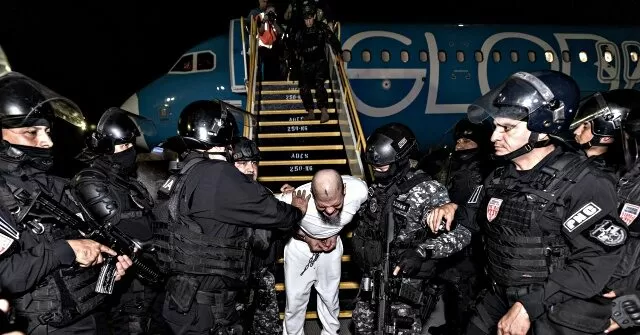Supreme Court Justice Samuel Alito recently issued a strongly-worded dissenting opinion after the Supreme Court temporarily paused the Trump administration’s planned deportations of Venezuelan migrants who are accused of being members of the notorious Tren de Aragua (TdA) gang. The decision came under the 1798 Alien Enemies Act, which allows the government to deport foreign nationals who pose a threat to national security.
In his dissenting opinion, Justice Alito questioned the justification behind the Supreme Court’s decision to halt the deportations, stating that it was “prematurely granted” and an “unprecedented” use of emergency relief. He argued that the government has a right to enforce immigration laws and protect its citizens from potential threats, such as gang violence.
The TdA gang, also known as the Aragua Train, has been wreaking havoc in Venezuela for years. They are responsible for a long list of crimes, including drug trafficking, extortion, and even murder. Their ruthless tactics have caused widespread fear and insecurity in the streets of the country, and many Venezuelans have fled in search of safety and a better life.
However, the recent influx of Venezuelan migrants into the United States has raised concerns about potential gang members entering the country. The Trump administration has been working to deport these individuals, but the Supreme Court’s decision has put a temporary halt to these efforts.
Justice Alito believes that this decision goes against the principle of national security and the government’s duty to protect its citizens. He expressed concern that the TdA gang members might slip through the cracks and enter the United States, posing a threat to public safety.
The dissenting opinion also touched on the issue of separation of powers. Justice Alito argued that the Supreme Court’s decision interferes with the executive branch’s responsibility to enforce immigration laws. He stated that the court should not meddle in such matters, as it goes beyond its jurisdiction and hinders the government’s ability to carry out its duties effectively.
Many have praised Justice Alito’s dissenting opinion, calling it a bold stance against the Supreme Court’s decision. They see it as a reminder of the importance of upholding national security and the rule of law. The dissenting opinion has also sparked discussions on the role of the judiciary and the balance of powers in the country.
On the other hand, some have criticized Justice Alito’s statements, stating that it disregards the rights of the Venezuelan migrants who are seeking asylum in the United States. They argue that the TdA gang members should not be treated as a representation of all Venezuelan migrants and that their safety should also be taken into consideration.
The Trump administration has not commented on the Supreme Court’s decision or Justice Alito’s dissenting opinion. However, the issue of immigration and national security remains a contentious issue in the United States, with strong opinions on both sides.
In the end, the Supreme Court’s decision to pause the deportations of Venezuelan migrants accused of being TdA gang members raises important questions about the balance of powers and the government’s responsibility to protect its citizens. While Justice Alito’s dissenting opinion urges caution and a focus on security, it also highlights the need to consider the rights of individuals seeking asylum and a better life. It is a complex issue that requires thoughtful consideration and careful decision-making.
The Supreme Court’s decision may have temporarily halted the deportation of TdA gang members, but the debate surrounding it will continue. As the country grapples with the larger issue of immigration, it is crucial to find a solution that balances the needs of national security and the rights of individuals seeking refuge. Only then can we ensure a fair and just system for all.






![Complete BritRail Pass Guide [Types, How to Use It, Pros + Cons]](https://inside-news.uk/wp-content/uploads/2025/06/00221EB4-BCA2-4DBB-6CD4-83DBC37D71FA-120x86.webp)















